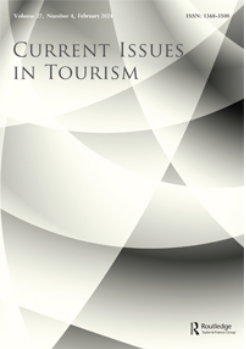利用feed搜索信息预测游客到达
IF 4.6
3区 管理学
Q1 HOSPITALITY, LEISURE, SPORT & TOURISM
引用次数: 0
摘要
摘要提要指数是内容引擎主动推荐并分发给用户的反应次数(即阅读、评论、转发、喜欢和不喜欢等)的加权和。内容可定制,为目的地营销组织提供有价值的互联网大数据信息和高营销价值。本文对饲料指数对游客到访预测精度的影响进行了大规模实证研究,提出了将饲料指数纳入游客到访预测模型的新方法,预测精度更高。首先,实证结果表明,不同关键词的饲料指数反映了不同的游客偏好,对游客到达运动有不同的影响,并具有不同的超前-滞后关系。其次,研究表明,在理论分析的基础上,结合熵分析等新方法,需要对关键词进行精心选择。因此,我们提出利用熵来选择关键词和时间滞后,从而有助于提高预测精度。关键词:游客到达预测饲料指数ARMAX季节性ARMAX披露声明所有作者对本研究贡献均等。作者未发现潜在的利益冲突。本文得到了国家自然科学基金(基金号:72271089)、湖南省自然科学基金(基金号:2022JJ30401)和澳门基金的部分资助。本文章由计算机程序翻译,如有差异,请以英文原文为准。
Tourist arrival forecasting using feed search information
ABSTRACTThe feed index is a weighted sum of the number of reactions (i.e. reading, comments, retweets, likes and dislikes, and so on.) that the content engine actively recommends and distributes to the users. It provides valuable information from big data on the Internet and high marketing value to Destination Marketing Organization as the content can be customized. A large-scale empirical study on the impact of the feed index on tourist arrival forecasting accuracy has been conducted, with a new approach proposed to incorporate the feed index into the tourist arrival forecasting model with higher forecasting accuracy. Firstly, the empirical results suggest that the feed index for different keywords reflects varying tourist preferences and has different impacts on tourist arrival movements, with variant lead-lag relationships. Secondly, the study shows that keywords need to be carefully selected based on theoretical analysis plus new methods such as entropy analysis. Therefore, it is proposed that entropy is employed to select the keywords and time lags, thus helping improve forecasting accuracy.KEYWORDS: Tourist arrival forecastingfeed indexARMAXseasonal ARMAX Disclosure statementAll authors had equal contribution to this research. No potential conflict of interest was reported by the authors.Notes1 https://index.baidu.com/v2/main/index.html#/help?anchor=pdescAdditional informationFundingThe work described in this paper was supported by a grant from National Natural Science Foundation of China (grant number 72271089), Hunan Provincial Natural Science Foundation of China (grant number 2022JJ30401) and partially sponsored by a scholarship from the Macao Foundation.
求助全文
通过发布文献求助,成功后即可免费获取论文全文。
去求助
来源期刊

Current Issues in Tourism
HOSPITALITY, LEISURE, SPORT & TOURISM-
CiteScore
15.50
自引率
10.00%
发文量
230
期刊介绍:
Journal metrics are valuable for readers and authors in selecting a publication venue. However, it's crucial to understand that relying on any single metric provides only a partial perspective on a journal's quality and impact. Recognizing the limitations of each metric is essential, and they should never be considered in isolation. Instead, metrics should complement qualitative reviews, serving as a supportive tool rather than a replacement. This approach ensures a more comprehensive evaluation of a journal's overall quality and significance, as exemplified in Current Issues in Tourism.
 求助内容:
求助内容: 应助结果提醒方式:
应助结果提醒方式:


